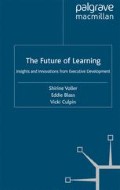Abstract
Oriented by complexivist and ecological discourses, teaching and learning seem to be more about expanding the space of the possible and creating the conditions for the emergence of the as-yet unimagined, rather than about perpetuating entrenched habits of interpretation. Teaching and learning are not about convergence onto a pre-existent truth, but about divergence – about broadening what is knowable, doable, and beable. The emphasis is not on what is, but on what might be brought forth. Thus learning comes to be understood as a recursively elaborative process of opening up new spaces of possibility by exploring current spaces.
Access this chapter
Tax calculation will be finalised at checkout
Purchases are for personal use only
Preview
Unable to display preview. Download preview PDF.
References
C. Breen, ‘A cautionary tale about rabbits, moles and choices’, Pythagoras, Vol. 23 (1990), 20–22.
C. Breen, ‘Teacher Education: confronting preconceptions’, Perspectives in Education, Vol. 13, No. 1 (1992), 33–44.
C. Breen, ‘Holding the tension of the opposites’, For the Learning of Mathematics, Vol. 13, No. 1 (1993), 6–10.
C. Breen, ‘Re-searching teaching: Changing paradigms to improve practice’, in M.A. Clements, H. Tairab and W.K. Yoong (eds), Science, Mathematics and Technical Education in the 20th and 21st Centuries (Department of Science and Mathematics Education: Universiti Brunei Darassalam, 2000), 94–103.
C. Breen, ‘Researching teaching: Telling the hole’d truth and nothing but my truth’, in A. Rogerson (ed.), Proceedings of the 3rd Mathematics Education into the 21st Century Project conference (Palm Cove, Cairns, Australia, August 19–24, 2001).
C. Breen, ‘Researching teaching: Moving from gut feeling to disciplined conversation’, South African Journal of Higher Education, Vol. 16, No. 2 (2002), 25–31.
C. Breen, ‘Perturbating the assessment of individuals and groups: Listening for challenges to mathematics teacher educators’, Pythagoras 60 (December 2004a), 2–12.
C. Breen, ‘In the serpent’s den: Contrasting scripts relating to fear of mathematics’, in M. Høines and A. Fuglestad (eds), Proceedings of the 28th Conference of the International Group for the Psychology of Mathematics Education, Vol. 2 (2004b), 167–174, Bergen, Norway.
C. Breen, ‘Promising practices in teaching and learning’, in C. Kasanda (ed.), Proceedings of the 13th Annual Conference of the Southern African Association for Research in Mathematics, Science and Technology Education, January 2005, Safari Conference Centre, Windhoek, Namibia.
C. Breen, ‘Tugging at psychological threads in mathematics education’, in T. Brown (ed.), The Psychology of Mathematics Education: A Psychoanalytic Displacement (Sense: Rotterdam, 2008a), 219–230.
C. Breen, ‘The hole is more than the sum of its parts: Mathematics teacher education in a complex world’, Notices of the South African Mathematical Society, Vol. 39, No. 1, April (2008b), 15–30.
F. Capra, The Web of Life (London: HarperCollins, 1997).
T. Dalmau, The Six Circle Lens (1995). Available at: http://www.dalmau.com/pdfs/six_circle_lens.pdf Accessed 9 July 2010.
J. David, Unpublished lecture notes on Plato and Logic, Public lecture given at the University of Cape Town, July (1992).
B. Davis, Teaching Mathematics: Towards A Sound Alternative (New York: Garland Publishing, 1996).
B. Davis, Inventions of Teaching: A Genealogy (London: Lawrence Erlbaum, 2004).
B. Davis and D. Sumara, ‘Cognition, complexity, and teacher education’, Harvard Educational Review, Vol. 67, No. 1 (1997), 104–125.
B. Davis and D. Sumara, Innovation and Complexity Thinking 2.0, Available from: http://education.alberta.ca/media/890564/innovation%20and%20complexity%20thinking%202.0-brent%20davis%20and%20dennis%20sumara.pdf Accessed 9 December 2008.
N. Depraz, F. Varela and P. Vermersch, On Becoming Aware (Amsterdam: John Benjamins, 2003).
D. Goleman, Vital Lies, Simple Truths (New York: Bloomsbury Publishing, 1997).
D. Henderson, Experiencing Geometry: On Plane and Sphere (New York: Prentice-Hall 1995).
D. Hock, The Birth of the Chaordic Age (New York: Berrett-Koehler, 1999).
J. Hollis, On This Journey We Call Our Life (Toronto: Inner City Books, 2003).
H. Kimberley and M. Fernbach (2006), Research in the Middle: The Link between Issues and Actions in Equity Research. AVETRA conference, 19–21 April. Available at http://www. avetra.org.au/ABSTRACTS2006/PA%200057.pdf Accessed: 8 July 2010.
J. Mason, Researching Your Own Practice: The Discipline of Noticing (London: Routledge-Falmer, 2002).
H. Maturana, ‘Everything said is said by an observer’, in W.I. Thompson (ed.), Gaia: A Way of Knowing (New York: Lindisfarne Press, 1987).
H. Maturana and F. Varela, The Tree of Knowledge (New York: Shambhala, 1986).
M. Merleau-Ponty, Phenomenology of Percepti (London: Routledge, 1962).
Scharmer, C. Otto, Theory U: Leading from the Future as It Emerges (Cambridge, Massachusetts: Society for Organisational Learning, 2007).
P. Senge, C.O. Scharmer, J. Jaworski and B.S. Flowers, Presence: Human Purpose and the Field of the Future (Cambridge, Massachusetts: Society for Organisational Learning, 2004).
D. Simons, Gorilla Movie (2007). Available from: http://viscog.beckman.illinois.edu/flashmovie/15.php
F.J. Varela, Ethical Know-How (Stanford: Stanford University Press, 1999).
F.J. Varela, E. Thompson and E. Rosch, The Embodied Mind: Cognitive Science and Human Experience (Cambridge, MA: The Press MIT, 1991).
M. Wheatley, Finding Our Way: Leadership for an Uncertain Time (New York: Berrett-Koehler, 2005).
Editor information
Editors and Affiliations
Copyright information
© 2011 the contributors
About this chapter
Cite this chapter
Breen, C. (2011). Re-cognising Learning and Teaching: Opening the Space of Possibility. In: Voller, S., Blass, E., Culpin, V. (eds) The Future of Learning. Palgrave Macmillan, London. https://doi.org/10.1057/9780230306356_11
Download citation
DOI: https://doi.org/10.1057/9780230306356_11
Publisher Name: Palgrave Macmillan, London
Print ISBN: 978-1-349-31649-6
Online ISBN: 978-0-230-30635-6
eBook Packages: Palgrave Business & Management CollectionBusiness and Management (R0)

